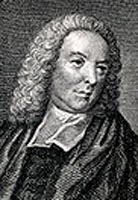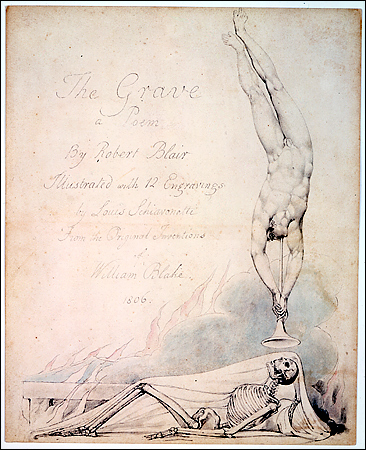|
Graveyard Poets
The "Graveyard Poets", also termed "Churchyard Poets", were a number of pre-Romantic poets of the 18th century characterised by their gloomy meditations on mortality, "skulls and coffins, epitaphs and worms" elicited by the presence of the graveyard. Moving beyond the elegy lamenting a single death, their purpose was rarely sensationalist. As the century progressed, "graveyard" poetry increasingly expressed a feeling for the "sublime" and uncanny, and an antiquarian interest in ancient English poetic forms and folk poetry. The "graveyard poets" are often recognized as precursors of the Gothic literary genre, as well as the Romantic movement. Overview The Graveyard School is an indefinite literary grouping that binds together a wide variety of authors; what makes a poem a "graveyard" poem remains open to critical dispute. At its narrowest, the term "Graveyard School" refers to four poems: Thomas Gray's "Elegy Written in a Country Churchyard", Thomas Parnell's "Night-Piece on Dea ... [...More Info...] [...Related Items...] OR: [Wikipedia] [Google] [Baidu] |
Death
Death is the irreversible cessation of all biological functions that sustain an organism. For organisms with a brain, death can also be defined as the irreversible cessation of functioning of the whole brain, including brainstem, and brain death is sometimes used as a legal definition of death. The remains of a former organism normally begin to decompose shortly after death. Death is an inevitable process that eventually occurs in almost all organisms. Death is generally applied to whole organisms; the similar process seen in individual components of an organism, such as cells or tissues, is necrosis. Something that is not considered an organism, such as a virus, can be physically destroyed but is not said to die. As of the early 21st century, over 150,000 humans die each day, with ageing being by far the most common cause of death. Many cultures and religions have the idea of an afterlife, and also may hold the idea of judgement of good and bad deeds in one's life ... [...More Info...] [...Related Items...] OR: [Wikipedia] [Google] [Baidu] |
Romantic Poetry
Romantic poetry is the poetry of the Romantic era, an artistic, literary, musical and intellectual movement that originated in Europe towards the end of the 18th century. It involved a reaction against prevailing Enlightenment ideas of the 18th century, and lasted approximately from 1800 to 1850.Romanticism . Academic.brooklyn.cuny.edu. Retrieved 2012-05-17. Romantic poets rebelled against the style of poetry from the eighteenth century which were based around epics, odes, satires, elegies, epistles and songs. English Romantic poetry In early-19th-century England, the poet defined his and |
Mark Akenside
Mark Akenside (9 November 1721 – 23 June 1770) was an English poet and physician. Biography Akenside was born at Newcastle upon Tyne, England, the son of a butcher. He was slightly lame all his life from a wound he received as a child from his father's cleaver. All his relations were Dissenters, and, after attending the Royal Free Grammar School of Newcastle, and a dissenting academy in the town, he was sent in 1739 to the University of Edinburgh to study theology with a view to becoming a minister, his expenses being paid from a special fund set aside by the dissenting community for the education of their pastors. He had already contributed ''The Virtuoso, in imitation of Spenser's style and stanza'' (1737) to the ''Gentleman's Magazine'', and in 1738 ''A British Philippic, occasioned by the Insults of the Spaniards, and the present Preparations for War'' (also published separately). After one winter as a theology student, Akenside changed to medicine as his field o ... [...More Info...] [...Related Items...] OR: [Wikipedia] [Google] [Baidu] |
Thomas Chatterton
Thomas Chatterton (20 November 1752 – 24 August 1770) was an English poet whose precocious talents ended in suicide at age 17. He was an influence on Romantic artists of the period such as Shelley, Keats, Wordsworth and Coleridge. Although fatherless and raised in poverty, Chatterton was an exceptionally studious child, publishing mature work by the age of 11. He was able to pass off his work as that of an imaginary 15th-century poet called Thomas Rowley, chiefly because few people at the time were familiar with medieval poetry, though he was denounced by Horace Walpole. At 17, he sought outlets for his political writings in London, having impressed the Lord Mayor, William Beckford, and the radical leader John Wilkes, but his earnings were not enough to keep him, and he poisoned himself in despair. His unusual life and death attracted much interest among the romantic poets, and Alfred de Vigny wrote a play about him that is still performed today. The oil painting '' ... [...More Info...] [...Related Items...] OR: [Wikipedia] [Google] [Baidu] |
William Collins (poet)
William Collins (25 December 1721 – 12 June 1759) was an English poet. Second in influence only to Thomas Gray, he was an important poet of the middle decades of the 18th century. His lyrical odes mark a progression from the Augustan poetry of Alexander Pope's generation and towards the imaginative ideal of the Romantic era. Biography Born in Chichester, Sussex, the son of a hatmaker and former mayor of the town, Collins was educated at The Prebendal School, Winchester and Magdalen College, Oxford. While still at the university, he published the ''Persian Eclogues'', which he had begun at school. After graduating in 1743 he was undecided about his future. Failing to obtain a university fellowship, being judged by a military uncle as 'too indolent even for the army', and having rejected the idea of becoming a clergyman, he settled for a literary career and was supported in London by a small allowance from his cousin, George Payne. There he was befriended by James Thomson and ... [...More Info...] [...Related Items...] OR: [Wikipedia] [Google] [Baidu] |
Robert Blair (poet)
Rev Robert Blair (17 April 1699 – 4 February 1746) was a Scottish poet. His fame rests upon his poem '' The Grave'', which, in a later printing was illustrated by William Blake. Biography He was the eldest son of the Rev. Robert Blair, one of the king's chaplains, and was born at Edinburgh. He was educated at the University of Edinburgh and in the Netherlands, and in 1731 was appointed minister of Athelstaneford in East Lothian. In 1738, he married Isabella, daughter of Professor William Law, with whom he had six children. His family's wealth gave him leisure for his favourite pursuits: gardening and the study of English poets. Blair published only three poems. One was a commemoration of his father-in-law and another was a translation. His reputation rests entirely on his third work, '' The Grave'' (1743), which is a poem written in blank verse on the subject of death and the graveyard. It is much less conventional than its gloomy title might lead one to expect. Its religio ... [...More Info...] [...Related Items...] OR: [Wikipedia] [Google] [Baidu] |
James Macpherson
James Macpherson (Gaelic: ''Seumas MacMhuirich'' or ''Seumas Mac a' Phearsain''; 27 October 1736 – 17 February 1796) was a Scottish writer, poet, literary collector and politician, known as the "translator" of the Ossian cycle of epic poems. Early life and education Macpherson was born at Ruthven in the parish of Kingussie in Badenoch, Inverness-shire. This was a Scottish Gaelic-speaking area but near the Ruthven Barracks of the British Army, established in 1719 to enforce Whig rule from London after the Jacobite uprising of 1715. Macpherson's uncle, Ewen Macpherson joined the Jacobite army in the 1745 march south, when Macpherson was nine years old and after the Battle of Culloden, had had to remain in hiding for nine years. In the 1752-3 session, Macpherson was sent to King's College, Aberdeen, moving two years later to Marischal College (the two institutions later became the University of Aberdeen), reading Caesar's '' Commentaries'' on the relationships betwe ... [...More Info...] [...Related Items...] OR: [Wikipedia] [Google] [Baidu] |
Christopher Smart
Christopher Smart (11 April 1722 – 20 May 1771) was an English poet. He was a major contributor to two popular magazines, ''The Midwife'' and ''The Student'', and a friend to influential cultural icons like Samuel Johnson and Henry Fielding. Smart, a high church Anglican, was widely known throughout London. Smart was infamous as the pseudonymous midwife "Mrs. Mary Midnight" and for widespread accounts of his father-in-law, John Newbery, locking him away in a mental asylum for many years over Smart's supposed religious "mania". Even after Smart's eventual release, a negative reputation continued to pursue him as he was known for incurring more debt than he could repay; this ultimately led to his confinement in debtors' prison until his death. His two most widely known works are '' A Song to David'' and '' Jubilate Agno'', which are believed to have been written during his confinement in St. Luke's Asylum, although this is still debated by scholars as there is no record o ... [...More Info...] [...Related Items...] OR: [Wikipedia] [Google] [Baidu] |
William Cowper
William Cowper ( ; 26 November 1731 – 25 April 1800) was an English poet and Anglican hymnwriter. One of the most popular poets of his time, Cowper changed the direction of 18th-century nature poetry by writing of everyday life and scenes of the English countryside. In many ways, he was one of the forerunners of Romantic poetry. Samuel Taylor Coleridge called him "the best modern poet", whilst William Wordsworth particularly admired his poem ''Yardley-Oak''. After being institutionalised for insanity, Cowper found refuge in a fervent evangelical Christianity. He continued to suffer doubt and, after a dream in 1773, believed that he was doomed to eternal damnation. He recovered and wrote more religious hymns. His religious sentiment and association with John Newton (who wrote the hymn " Amazing Grace") led to much of the poetry for which he is best remembered, and to the series of Olney Hymns. His poem " Light Shining out of Darkness" gave English the phrase: "God mov ... [...More Info...] [...Related Items...] OR: [Wikipedia] [Google] [Baidu] |
Oliver Goldsmith
Oliver Goldsmith (10 November 1728 – 4 April 1774) was an Anglo-Irish novelist, playwright, dramatist and poet, who is best known for his novel '' The Vicar of Wakefield'' (1766), his pastoral poem '' The Deserted Village'' (1770), and his plays ''The Good-Natur'd Man'' (1768) and ''She Stoops to Conquer'' (1771, first performed in 1773). He is thought to have written the classic children's tale '' The History of Little Goody Two-Shoes'' (1765). Biography Goldsmith's birth date and year are not known with certainty. According to the Library of Congress authority file, he told a biographer that he was born on 10 November 1728. The location of his birthplace is also uncertain. He was born either in the townland of Pallas, near Ballymahon, County Longford, Ireland, where his father was the Anglican curate of the parish of Forgney, or at the residence of his maternal grandparents, at the Smith Hill House near Elphin in County Roscommon, where his grandfather Oliver Jones was ... [...More Info...] [...Related Items...] OR: [Wikipedia] [Google] [Baidu] |
Thomas Warton
Thomas Warton (9 January 172821 May 1790) was an English literary historian, critic, and poet. He was appointed Poet Laureate in 1785, following the death of William Whitehead. He is sometimes called ''Thomas Warton the younger'' to distinguish him from his father who had the same name. His most famous poem is ''The Pleasures of Melancholy'', a representative work of the Graveyard poets. Life Warton was born in Basingstoke, Hampshire, the son of poet Thomas Warton, the Elder, and younger brother of Joseph Warton and Jane Warton. As a youngster, Warton demonstrated a strong predilection toward writing poetry, a skill he would continue to develop all of his life.Life of Thomas Warton, the Younger In fact, Warton translated one of |



_Blue_Plaque.jpg)


